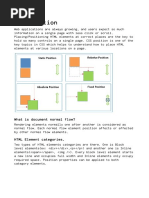0 ratings0% found this document useful (0 votes)
27 viewsJavascript For Pythonistas
Javascript for Pythonistas
Uploaded by
dorian451Copyright
© © All Rights Reserved
Available Formats
Download as PDF, TXT or read online on Scribd
0 ratings0% found this document useful (0 votes)
27 viewsJavascript For Pythonistas
Javascript for Pythonistas
Uploaded by
dorian451Copyright
© © All Rights Reserved
Available Formats
Download as PDF, TXT or read online on Scribd
You are on page 1/ 1
MODERN JS FOR PYTHONISTAS
Python JavaScript Collection operations
# Variables // Variables // Destructuring object
full_name = "Jane Hacker" let fullName = "Jane Hacker"; let {ola, oi} = translation;
pi = 3.14 const pi = 3.14; // ...and the reverse
const age = 3;
# lists ("Arrays" in JS) // Arrays ("lists" in Py) let info = {fullName, age};
names = ["John", "Paul", "G"] let names = ["John", "Paul", "G"];
// Combine obj, arrays with splat
# dicts (similar to "Objects") // Objects (similar to "dicts") const addedTranslations = {
translation = { let translation = { ...translation,
"ola": "Hello", ola: "Hello", gato: "cat",
"oi": "hi", oi: "Hi", };
} }; const extra = [...names, "Mary"];
# For loops // For loop
for name in names: for (let name of names) { Legacy Syntax
print("name:", name) console.log("name:", name);
}
# While loops // While loops // Loop through properties
x = 0 let x = 0; for (var i in arr) {}
while x < 3: while (x < 3) { // C-style: Loop through numbers
print("X:", x) console.log("X:", x); for (var i = 0; i < 100; i++) {}
x += 1 x++; var a = 3; // function-scoped
} a = 3; // globally scoped
# If-statements // If-statements
if full_name == "Jane": if (fullName === "Jane") {
print("Hi, Jane!") console.log("Hi, Jane!");
elif full_name == "Alice": Async & Callbacks
} else if (fullName === "Alice") {
print("Hey Alice") console.log("Hey Alice");
else: } else { // Callbacks (common in node.js)
print("Don’t know you") console.log("Don’t know you"); fs.readFile("file.txt",
} (err, data) => {
# List comprehension if (err) throw err;
long_names = [ // Array processing (map & filter)
console.log(data);
name.upper() for name in names let longNames = names
if len(name) > 3 .filter(n => n.length > 3) });
] .map(n => n.toUpperCase());
// Promise (common in browser)
# Functions // Functions fetch("http://site.com/api.json")
def greeter(name): function greeter(name) { .then(response => response.json())
print("Hi", name) console.log("Hi", name); .then(data => {
greeter("Bob") } console.log("Resp:", data);
greeter("Bob"); })
# Lambda function .catch(err => {
dst = lambda x, y: x*x + y*y // Arrow function expression console.log("error", err);
const dst = (x, y) => x*x + y*y; });
# Conjunctions // Conjunctions
if age < 18 and drink == "beer": if (age < 18 && drink === "beer") { asynchronous Instead of pausing
print("Too young kiddo") console.log("Too young kiddo"); (“blocking”) for a slow operation,
} the asynchronous approach is to
if age > 18 or drink == "soda": if (age > 18 || drink === "soda") { put-off starting the slow operation,
print("Great choice") console.log("Great choice"); then call a function (“callback”)
} at a later time to signal it’s done
# Class syntax // Class syntax callback A function passed as an argu-
class User(BaseUser): ment to be called later when an
class User extends BaseUser { event is triggered
def __init__(self, name): constructor(name) {
self.name = name promise Another popular way to do
this.name = name; callbacks, with a .then syntax
self.logged_in = False this.loggedIn = false;
def log_in(self): }
self.logged_in = True logIn() { Variable Declaration
this.loggedIn = true;
}
} let Declare a variable (block scoped)
user = User("jqhacker") let user = new User("jqhacker"); const Like let, cannot be reassigned.
JavaScript (ES6) kickstartcoding.com A cheatsheet by Kickstart Coding
You might also like
- The C# Player's Guide - 5th Edition - 5.0.083% (18)The C# Player's Guide - 5th Edition - 5.0.0497 pages
- Introduction To Computer Theory by Cohen Solutions Manual80% (5)Introduction To Computer Theory by Cohen Solutions Manual198 pages
- Ap Computer Science Principles Practice Exam and Notes 202186% (7)Ap Computer Science Principles Practice Exam and Notes 2021108 pages
- Hacking The Art of Exploitation 2nd Edition Jon Erickson100% (20)Hacking The Art of Exploitation 2nd Edition Jon Erickson492 pages
- PrepTest 83 - Print and Take Test - 7sage Lsat100% (3)PrepTest 83 - Print and Take Test - 7sage Lsat46 pages
- Comparison Between Python and JavaScriptNo ratings yetComparison Between Python and JavaScript3 pages
- Core Javascript Documentation: Release 0.0No ratings yetCore Javascript Documentation: Release 0.036 pages
- Introduction To Javascript: Course Material - Lecture NotesNo ratings yetIntroduction To Javascript: Course Material - Lecture Notes35 pages
- What Is Javascript?: Javascript Is Interpreted by The Browser. Js Code Is Typically Embedded Right in HTML PagesNo ratings yetWhat Is Javascript?: Javascript Is Interpreted by The Browser. Js Code Is Typically Embedded Right in HTML Pages21 pages
- Unit 4 - JavaScript (Error Handling & JSON)No ratings yetUnit 4 - JavaScript (Error Handling & JSON)29 pages
- Web Developer Bootcamp (Notes) (Code Comented)No ratings yetWeb Developer Bootcamp (Notes) (Code Comented)6 pages
- Instant ebooks textbook Javascript info Ebook Part 1 The JavaScript language 1st Edition Ilya Kantor download all chapters100% (4)Instant ebooks textbook Javascript info Ebook Part 1 The JavaScript language 1st Edition Ilya Kantor download all chapters65 pages
- Java Programming Tutorial With Screen Shots & Many Code ExampleFrom EverandJava Programming Tutorial With Screen Shots & Many Code ExampleNo ratings yet
- CSS Position: What Is Document Normal Flow?No ratings yetCSS Position: What Is Document Normal Flow?20 pages
- Configuring Ubuntu For Python Web Development - BPP PythonNo ratings yetConfiguring Ubuntu For Python Web Development - BPP Python3 pages
- JavaScript Prototype and Prototype ChainNo ratings yetJavaScript Prototype and Prototype Chain25 pages
- Beginner Level Javascript Interview Questions and Answers For FreshersNo ratings yetBeginner Level Javascript Interview Questions and Answers For Freshers19 pages
- Django CRUD (Create, Retrieve, Update, Delete) Function Based ViewsNo ratings yetDjango CRUD (Create, Retrieve, Update, Delete) Function Based Views8 pages
- Location: POD 60 Phone: (416) 979 - 5177 Email: Career@ryerson - Ca Hours: Mon - Thu 8:30 Am - 6:30 Pm/fri 8:30 Am - 4:30 PMNo ratings yetLocation: POD 60 Phone: (416) 979 - 5177 Email: Career@ryerson - Ca Hours: Mon - Thu 8:30 Am - 6:30 Pm/fri 8:30 Am - 4:30 PM36 pages
- Coding With JavaScript For Dummies Everything To Know About JavaScript (2020) - 40153100% (1)Coding With JavaScript For Dummies Everything To Know About JavaScript (2020) - 40153247 pages
- NWO, Illuminati, Freemason, Occult, Bible Prophecy, Conspiracy, Secret Society, Etc. LinksNo ratings yetNWO, Illuminati, Freemason, Occult, Bible Prophecy, Conspiracy, Secret Society, Etc. Links47 pages
- Structured and Unstructured Maintenance With Example0% (1)Structured and Unstructured Maintenance With Example9 pages
- Learn To Code HTML and CSS Develop Style Websites PDF100% (2)Learn To Code HTML and CSS Develop Style Websites PDF595 pages
- Python Programming For Beginners - A Crash Course To Learn Python and Other Recommended Coding83% (6)Python Programming For Beginners - A Crash Course To Learn Python and Other Recommended Coding86 pages
- LINUX COMMAND LINE An Introduction To Linux Command Line EnvironmentNo ratings yetLINUX COMMAND LINE An Introduction To Linux Command Line Environment174 pages
- How To Use PATS Module Initialization FunctionNo ratings yetHow To Use PATS Module Initialization Function5 pages
- PC-JX-XX E&I Interface Function Test - TemplateNo ratings yetPC-JX-XX E&I Interface Function Test - Template2 pages
- Microsoft Windows Server 2019 For Dell Emc Poweredge ServersNo ratings yetMicrosoft Windows Server 2019 For Dell Emc Poweredge Servers32 pages
- TC303 Thermostat For Hotel, Modbus NetworkingNo ratings yetTC303 Thermostat For Hotel, Modbus Networking4 pages
- Procedure For Registration of Partnership FirmNo ratings yetProcedure For Registration of Partnership Firm4 pages























































































































